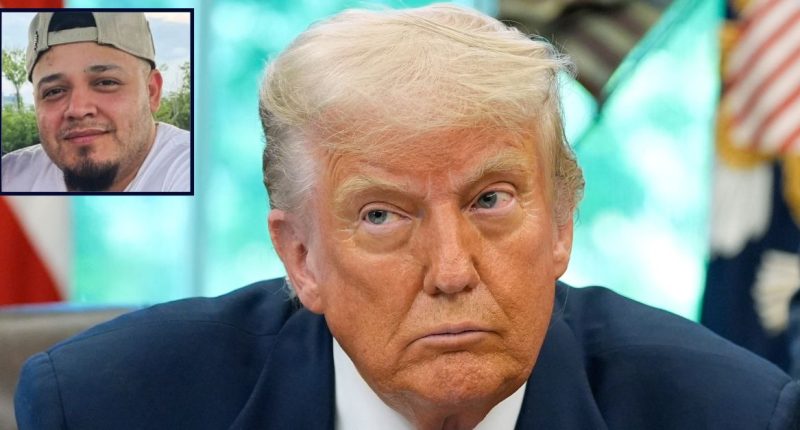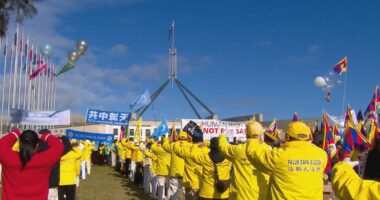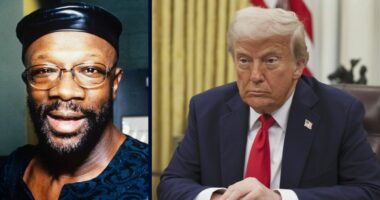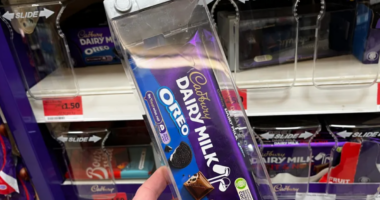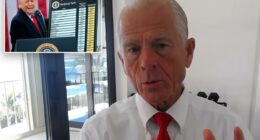Share this @internewscast.com
Main: President Donald Trump engages with the press while signing executive orders and proclamations in the Oval Office of the White House, Monday, May 5, 2025, in Washington (AP Photo/Alex Brandon). Inset: A recent photo of Kilmar Abrego Garcia (CASA).
On Sunday, a federal judge in Tennessee ordered the release of Kilmar Abrego Garcia on bond as he awaits trial for federal migrant smuggling charges. The judge reasoned that the Trump administration did not prove that the man, mistakenly deported to an infamous Salvadoran terrorist prison, was a flight risk or posed a danger to the community after being brought back to the U.S. earlier this month following his indictment.
Nonetheless, the critical 51-page ruling by U.S. District Judge Barbara D. Holmes is likely to have minimal practical impact, as she acknowledged that once released from the attorney general’s custody, Abrego Garcia will “likely remain in U.S. Immigration and Customs Enforcement (ICE) custody, facing anticipated removal proceedings beyond this Court’s jurisdiction.”
Despite referring to her own determination on the detention issue as “little more than an academic exercise,” Holmes noted the importance of the matter, writing that due process, which Abrego Garcia was denied prior to his unlawful deportation, is “the foundation of the administration of our criminal law.”
“Abrego, like every person arrested on federal criminal charges, is entitled to a full and fair determination of whether he must remain in federal custody pending trial,” Holmes wrote. “The Court will give Abrego the due process that he is guaranteed.”
As Holmes reviewed the evidence presented by federal prosecutors, she immediately called out the government for repeatedly claiming that Abrego Garcia engaged in “human trafficking” when he was actually charged with “smuggling.”
“To be clear, the offenses of which Abrego is charged are human smuggling, not human trafficking. Although “smuggling’ and ‘trafficking’ were sometimes used interchangeably during the detention hearing, there is a distinct difference between the two under the law. They are not transposable,” she wrote, adding that trafficking “involves exploiting men, women, or children for the purposes of forced labor or commercial sexual exploitation.”
Abrego Garcia has pleaded not guilty to the charges while his attorneys have called the case against him a “farce.”
Holmes also emphasized that the Justice Department’s claims that Abrego Garcia’s alleged crimes involved children — a point prosecutors relied on in seeking to keep him in pretrial detention — appeared to be based on “questionable” evidence as well as biased and unreliable testimony from cooperators who had made deals with the government to defer their own pending deportations.
Three of the cooperators — one female and two males — testified before a grand jury that Abrego Garcia regularly brought his own minor children with him to provide “cover” while allegedly engaging in migrant smuggling, thereby placing the kids in an inherently dangerous situation. But Holmes was quick to throw cold water on the cooperators’ claims, which were relayed to the court by Homeland Security Special Agent Peter Joseph during a hearing earlier this month, writing:
“The Court gives little weight to this hearsay testimony – double hearsay through Special Agent Joseph’s testimony – of the first male cooperator, a two-time, previously-deported felon, and acknowledged ringleader of a human smuggling operation, who has now obtained for himself an early release from federal prison and delay of a sixth deportation by providing information to the government. Nor do the hearsay statements of the second male cooperator on this issue fare any better, as his requested release from jail and delay of another deportation depends on providing information the government finds useful. Even without discounting the weight of the testimony of the first and second male cooperators for the multiple layers of hearsay, their testimony and statements defy common sense.
She said claims that Abrego Garcia took his kids with him on round trips from Maryland to Houston three or four times each week were hard to believe.
“The sheer number of hours that would be required to maintain this schedule, which would consistently be more than 120 hours per week of driving time, approach physical impossibility,” she wrote. “For that additional reason, the Court finds that the statements of the first and second male cooperators are not reliable to establish that this case ‘involves a minor victim.'”
The court also noted that the government’s evidence of Abrego Garcia being a member of the MS-13 gang consisted only of “general statements, all double hearsay, from two cooperating witnesses,” which were “contradicted” by the third cooperator.
“Given the volume of resources committed to the government’s investigation of Abrego since April 2025, according to Special Agent Joseph, the Court supposes that if timely, more specific, concrete evidence exists of Abrego’s alleged MS-13 gang membership or a consistent pattern of intentional conduct designed to threaten or intimidate specific individuals, the government would have offered that evidence at the detention hearing,” Holmes wrote, adding, “the government’s evidence of Abrego’s alleged gang membership is simply insufficient.”
Following the court’s order, the Trump administration immediately sought to have the ruling stayed pending appeal.
A hearing on the matter is currently scheduled to take place on Wednesday at 2 p.m. CDT.
Also this week, the Trump administration is required to respond to the federal judge in Maryland presiding over Abrego Garcia’s civil case, who has threatened to hold government officials in contempt for spending months stonewalling the court and flouting her order to “facilitate” Abrego Garcia’s return to the country.
